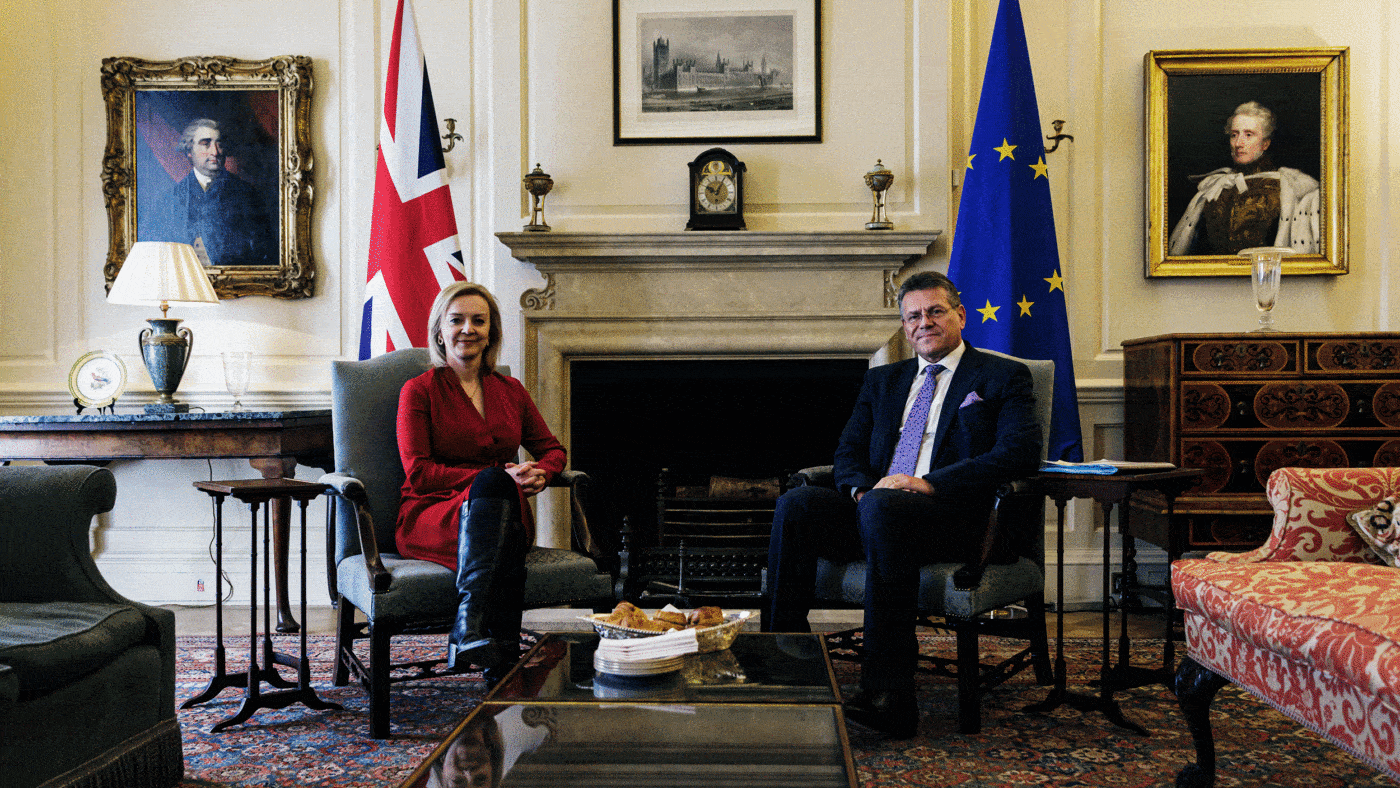Yesterday, the whole country waited expectantly to learn whether Boris Johnson would accept that his troubled premiership had finally come to an end. Now that he has decided to resign, no region is likely to be affected more profoundly than Northern Ireland.
Right at the start of his time in office, in late 2019, the Prime Minister betrayed his Ulster unionist allies by signing a protocol with the EU that cut the province off from the rest of the UK’s economic and political life.
The ‘Irish Sea border’ stopped some suppliers from sending goods to Northern Ireland altogether, raised the cost of ‘importing’ other products from Great Britain, and left Ulster under Brussels’ rules for goods, agriculture, customs, VAT and subsidies. Its most controversial and destabilising effect was to undermine the province’s constitutional position, overriding critical parts of the Acts of Union and handing authority over important aspects of life to EU officials.
Whether Johnson genuinely failed to foresee these problems, or whether he eventually felt a sense of responsibility for their impact on Northern Ireland, we cannot know for certain. But we do know that his government subsequently tried to extricate itself from some of the Protocol’s worst features.
Under Johnson’s leadership, the UK unilaterally extended ‘grace periods’ that exempted food and parcels from checks and paperwork at the Irish Sea border. Then last month, after two years of futile negotiations with the EU, the Prime Minister and his foreign secretary, Liz Truss, unveiled a Northern Ireland Protocol Bill that promised to restore full access to the British internal market and put right some of the Protocol’s glaring constitutional anomalies.
Ironically, the prime minister who originally damaged the Union so gravely now appeared to offer the best chance of repairing the UK’s integrity. That’s why the upcoming battle over who will lead the Tory party and the country creates particular uncertainty and anxiety in Northern Ireland.
In February, the province’s biggest unionist party, the DUP, pulled out of the power-sharing executive at Stormont, in protest against the Protocol. In May, after fresh elections to the devolved Assembly, it again refused to nominate ministers, arguing that politics here could not continue ‘as normal’ unless Northern Ireland’s place in the Union was fully restored.
Among rival pro-Union politicians in Ulster, there were differing attitudes to the DUP’s tactics. The Ulster Unionist party (UUP) argued that its stance was self-defeating, because it damaged voters’ faith in Northern Ireland’s democratic institutions and deprived them of a say in devolved decision-making. The Traditional Unionist Voice (TUV), maintained that the DUP should not re-enter the Executive until every trace of the Protocol was destroyed.
Almost all unionists accepted that the Protocol had damaged the Belfast Agreement, because it undermined the ‘principle of consent’, which determines that the province should remain part of the UK, unless a majority of voters decide otherwise through a ‘border poll’. The UUP’s former leader, David Trimble, one of the key architects of the Good Friday deal, said he felt personally ‘betrayed’ by the sea border.
The Protocol Bill, while it wasn’t perfect, offered hope that the Union could eventually be repaired and provided a potential route to restoring the power-sharing institutions at Stormont. Now, the people of Northern Ireland, and unionists in particular, will wonder whether its passage through parliament depended upon Boris Johnson’s survival as Prime Minister, or whether the new Conservative leader, whoever that turns out to be, will champion the policy just as strongly.
The minister most associated with the legislation, other than Johnson himself, was the foreign secretary, Liz Truss. Indeed, some commentators suggested that she persuaded the Prime Minister to support its more controversial clauses, like dual regulation for domestic Northern Ireland goods. The implication was that Boris actually favoured less rigorous and, potentially, less confrontational methods of dealing with the Protocol.
It’s looked for some time like the foreign secretary is preparing for a leadership contest and trying to bolster her reputation among Tory members. She’s been forthright about the Protocol, but unionists will remember that Boris Johnson was Theresa May’s foremost critic, when she accepted the idea of a border in the Irish Sea. Yet, after unseating her as prime minister, he supported the deal that put it in law.
It’s even less clear whether other potential contenders to become Tory leader would see the Protocol Bill as a priority, or whether they would use it to distance themselves from Boris Johnson’s administration. The legislation prompted a hysterical reaction from many journalists and politicians when it was introduced, so it will take a strong and self-confident Prime Minister to steer it through parliament.
Boris Johnson was not so much strong as rash and impetuous. His reluctance to resign, even while his government disintegrated, was shaped by an abnormal instinct for surviving crises. For a while, it looked like, if this country was ever subjected to a nuclear winter, Boris would have crawled out of the wreckage just before the cockroaches.
Johnson’s undignified exit will certainly tarnish his legacy, but the Protocol Bill is one political endowment that should not be discarded casually. Unionists in Northern Ireland will hope that, whoever is the eventual victor in the Tory leadership contest, he or she remains committed to repairing the damage inflicted by the Protocol and prioritising the integrity of the United Kingdom, rather than mollifying Dublin and Brussels.
Click here to subscribe to our daily briefing – the best pieces from CapX and across the web.
CapX depends on the generosity of its readers. If you value what we do, please consider making a donation.


